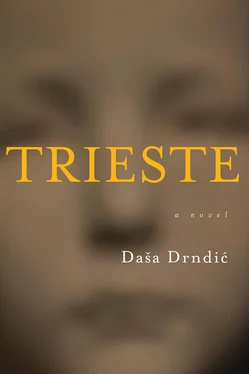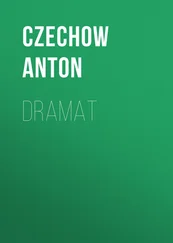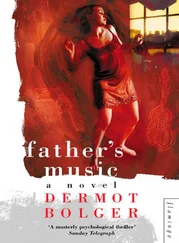When everything was done, the train didn’t pull out , says Elvira Weiner, they bolted the door again and the carriages stood there. And then there was an article in the newspaper… the citizens with houses near the train station, near platform one, had complained about the noise , says Elvira Weiner, because those in the railway carriages shouted, Let us out! Let us get out! and inside the people were banging so loudly that the people living around the train station could not sleep, so they protested, and then it was suggested these transports should be left on the side of the Landesmuseum, all the way beyond the Hauptbahnhof, on Museumstrasse, because there were no people living there and the transports wouldn’t be disturbing anyone, that is what they suggested , says Elvira Weiner, because I don’t think we wanted to know what was happening. We knew these people were going to Germany, we knew there were Jews inside, we knew about the concentration camps, and we had helped them, so why were they hollering now at night? That is what we were thinking, says Elvira Weiner. We gave them blankets and coffee and soup, why are they protesting? That is not polite, we thought, they are making a racket and we can’t sleep. That is how our citizens wrote, you know, this was wartime , says Elvira Weiner, and we all had our worries and that troubles me today, says Elvira Weiner, because if we hadn’t left the people like that, if the Government had gone back on its word, if we had said, We are not letting these people go on to Germany, then I guess the other transports wouldn’t have followed — and they did come, there were many transports, I think they had about eight, maybe twelve, and I went once more with my mother and, sure enough, the carriages were far away, near the Schweizerisches Landesmuseum, on the last platform, and the same thing happened, the blankets, the coffee, the soup, the banging and shouting, and then my mother said, You can’t go to the train station any more. You have to think about school. You can’t be coming home so late. You have to get your sleep. I don’t know which people went there to help. We didn’t dare talk. It was verboten to talk , says Elvira Weiner. It was pretty dark anyway. We had only our torches, it was very dark, but I remember when the door opened on one of the carriages I saw a man with a white face at the door, with a terribly white face in the darkness. At that meeting I saw people I knew, people my age. I had gone skiing with some of them. The adults I didn’t know. My aunt knew them. I think there were Jews there, I knew one man, a lawyer, he said, Hello, kid, but there at that platform he pretended not to know me. The Swiss Red Cross contacted Jews, I think that the Swiss Red Cross contacted Jews in secret, I think the other people knew nothing about those transports, I think they had no clue, and the Swiss Red Cross felt they were making a grand gesture, a great humane gesture, besides the Swiss Red Cross behaved that way, as if it were the saviour, as if the Swiss Red Cross saved all those people with those blankets, that coffee and that soup. I don’t know if the Swiss Red Cross ever considered stopping these trains, freeing the people. I don’t know, says Elvira Weiner. We knew nothing, we knew only that there were Jews and Gypsies going to Germany and beyond — we didn’t know where beyond — and that they had to go through Switzerland, because the Brenner Pass was closed. That’s what my mother told me, but at the meeting somebody also asked, Why do they have to go through Switzerland? I mean, nobody was happy about the trains going through Switzerland, that Switzerland was involved, because Switzerland claimed to be a neutral country, and it turned out not to be so neutral after all, especially as far as the banks were concerned, that still remains to be proved, says Elvira Weiner. At the meeting someone said, Maybe they are political prisoners, but I knew, in my family we knew, we knew, we assumed that they were taking those people to concentration camps, we knew there were different camps: Dachau, Bergen Belsen, Theresienstadt. Theresienstadt was a good camp. They didn’t kill there, we could have done something, at the time I didn’t think that way, everyone was thinking that the blankets, and the coffee, and the soup, that this was enough. I was sixteen — I was going to school — when we were waiting as those trains came slowly in to the station. We waited for the doors to open, and I thought, What will happen now? What if all those people come pouring out? What if they push away that man in uniform standing at the door and they start jumping off the train? What will we do then? Will someone put them back into those carriages? I wanted the people to get free, but I didn’t want them to get out here, with us, like when you look at animals at the zoo, you feel sorry for them for being in the cages, but you don’t want them to get out right where you are, they should be set free in some wild place, you think , says Elvira Weiner. Later I wondered — not then, later — why I had been saved, and some others were not, now I know: no-one was saved. When the war ended, my mother didn’t want to talk about it, she wanted to forget. I would ask her, What do you think happened to those people from the train? and she would say, Oh, Elvira, those were bizarre times. All that happened in late 1943 and early 1944. It was very cold. Later I heard it was no coincidence, there are no coincidences. I looked for information about those people — later, when my mother died — I looked for information. I heard how the partisans tried to sabotage the freight trains and stop them before they entered Switzerland, and how the Nazis rounded up people in the villages and towns and offered them free cigarettes, and then arrested them and loaded them onto trains and shipped them to Germany to the work camps, I heard they were successful, occasionally, in derailing trains, saving some people, says Elvira Weiner. In the archives there is information. I looked for it. In the archives it says that traffic through the Gotthard Pass in 1943 and 1944 was intense, that German trains passed through Switzerland every ten minutes on their way to Italy, and then I searched the archives of the Red Cross, but there is not a line in the archives of the Red Cross about the trains that passed through Zurich, not a line about the organized support, about those blankets and the coffee and the soup, nothing about the little help to the Italian prisoners, which was really nothing to speak of. Perhaps that is why there is no information about it anywhere, as if it never happened… says Elvira Weiner. But somewhere I found a little document, says Elvira Weiner, a slip of paper on which it says that the representative of the Swiss Red Cross in January 1944 contacted the German command, some S. S. officials, someone named Globočnik and someone named Rainer in northern Italy, related to “coordination of effort to offer aid to Italian citizens”, and then I went through the archives of the Swiss railways, says Elvira Weiner. I didn’t find anything. At the archives of the Swiss railways they said that in 1960 they moved their offices and at that time all their information about the train schedules and the movement of trains during the war was destroyed. Destroyed, says Elvira Weiner. The worst is that the freight carriages were sealed. They could only be opened from the outside, says Elvira Weiner. Maybe that was the worst .
I, too, have train-station nightmares, train-station nightmares, nightmares, frightening dreams, repeats Haya, while she digs around in the red basket, then finds a little photograph that, back in 1944, slid in — she doesn’t know how, she doesn’t know how, how did it slide in? — among the pictures that S.S.-Untersturmführer Kurt Franz gave her. Here it is, she says.
Читать дальше












